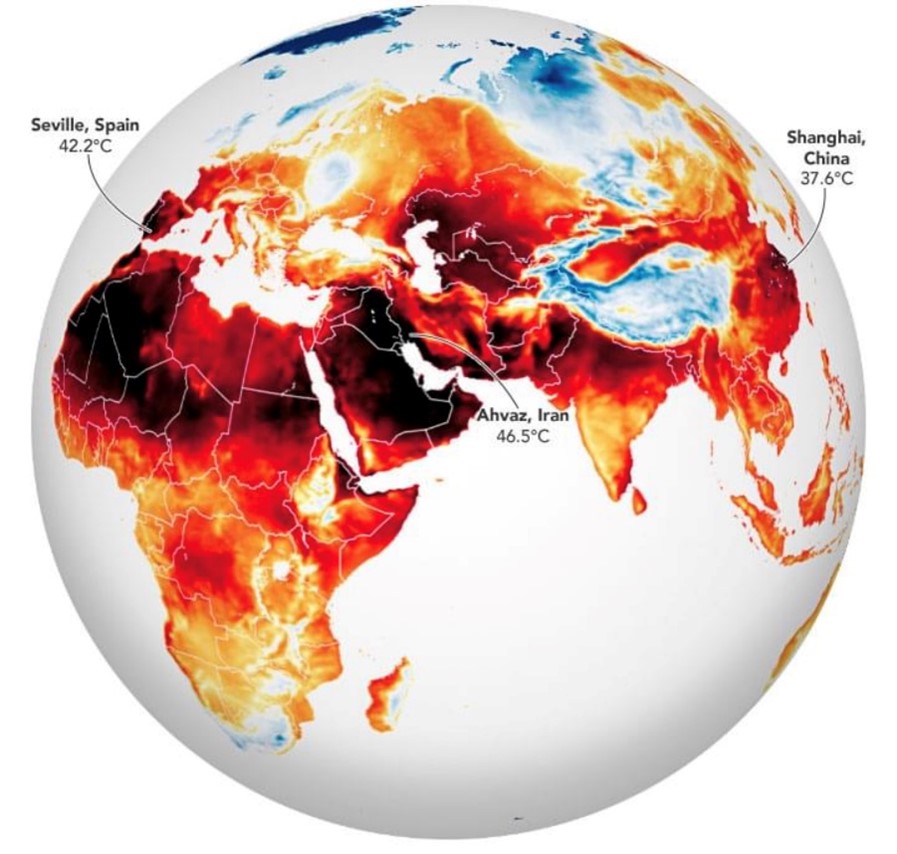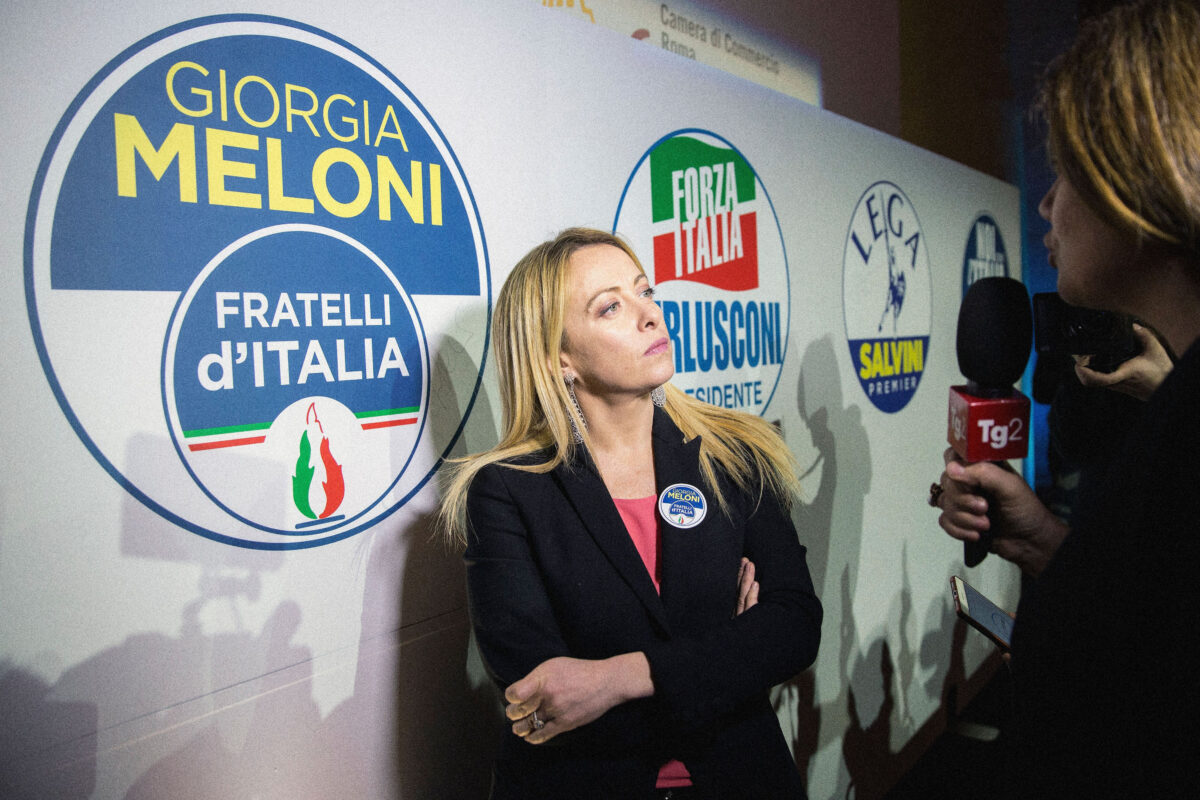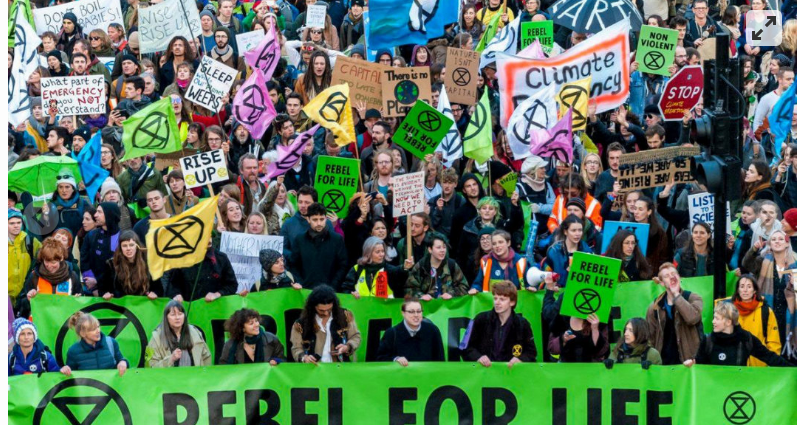The 10 days beginning on 12 June saw the convergence of four things that might seem at first not to be connected – the statement by UN secretary general António Guterres that the world was headed towards 3 per cent global heating by the end of the century which would be a ‘catastrophe’; the news that Saudi Arabia was seeking to buy 2.2 million tons of carbon credits; the news that at least 1000 people in Uttar Pradesh and eastern Bihar have died because of the extreme heat of over 40 degrees; and the deaths of more than 500 refugees in a boat off the Greek coast.

The connection of carbon ‘credits’ – a license to dump huge amounts of greenhouse gases into the atmosphere – to the statement by António Guterres and the deaths in India is pretty obvious. But how is the sinking of the overloaded refugees’ boat connected?
Revolution of the thirsty
More and more, desperate people seeking refuge in Europe are not just fleeing from economic disaster and war. Many are also refugees from climate collapse. A look at the map, where the average temperature has already risen to levels where water is scarce and human life is becoming unsustainable, tells its own story. In a swathe of Western and Central Asia summer temperatures routinely exceeding 40 degrees and the lack of water is causing more and more conflict. Some relief for the moment is available to the rich, with air-conditioned homes and offices. But for both the urban and rural poor living conditions are becoming atrocious.
This is not a new story. Largely unreported in the global North, the 2011 revolution that overthrew Egyptian ruler Hosni Mubarak was not just a democratic uprising, it was a ‘revolution of the thirsty’. The 60% of Cairo’s population that lives in informal settlements mainly lacks any regular access to water and many people are reduced to collecting it from polluted ditches. There are few water supply problems however in the affluent middle and upper class suburbs, many built over the last two decades with extensive facilities for the rich.
Fortress Europe is failing
If unliveable temperatures and water poverty are increasingly drivers of mass migration westwards and northwards, the response of the states of the Global North is disastrous and fuels the nationalistic and racist far right.
Just one day after the sinking of a refugee boat off the coast of Greece, with the loss of over 500 lives, a previously arranged meeting of EU interior ministers agreed a joint ‘plan’. This would see the European Union ‘work more closely with Tunisia, Libya and Egypt’ to try to stop undocumented migrants from boarding smuggler vessels. The thousands who are dying in the attempt to reach Europe by boat and the news of the drownings off the coast of Greece, did nothing to shift the Fortress Europe policy of the EU, it only strengthened it.
The figures for deaths in the Mediterranean are utterly shocking – more than 20,000 drowned or disappeared since 2014, more than 2,000 dead this year alone. The EU ‘plan’ is a joke, while the quotas confirmed for accepting refugees – a dozen countries accepting 8,000 each and France and Italy accepting 2,500 – are a pathetic gesture.
Historically mass migration of the desperate has never been completely stopped. The US border patrol has reported more than 7000 deaths at the Mexico/US border since 1998 – likely to be a big underestimate and not taking into account the many who have died in the Mexican desert or Central America during the journey from Colombia.
Mass death events
In an influential article Gaia Vince argues that by mid-century, because of the ageing population of the West, Global North cities will be crying out for more immigrants to sustain their workforce. But William I Robinson, author of Global Police State, thinks this is a ‘mechanical analysis’ and that right-wing nationalism and fascism in the Global North will likely lead the EU, Britain and the United States to tolerate mass death rather than admit hundreds of thousands of refugees[1]. The desperate will always come and they know that perilous journeys always carry the risk of death.
How do the global water crisis and global migrant crisis fuel fascism and war? Immigration has been the key political issue – combined with an ‘anti-woke’ discourse based on reactionary ideas about the family, religion and the nation – that has enabled the fascist and semi-fascist right to take power in Italy[2]. Long-time extreme right leader Marine Le Pen could win the next presidential election in France. And the mainstream right-wing Popular Party in Spain could form a governmental alliance with the fascist Vox party, currently polling around 15% in opinion polls, after the July 23 general election[3].
Climate change and the fascist right

Like other far right leaders, Marine Le Pen has made a shift on climate change. Denial is hardly possible any more – although Donald Trump may persist in it. So Le Pen argues that only true patriots can defend the environment and the nation, and that ‘nomads’ have no interest in defending the environment. Le Pen’s denunciation of migrants as ‘rootless nomads’ parallels the Nazis’ attack on ‘rootless cosmopolitans’ – in other words Jewish people.
The claim that environmentalism is an issue for the right has also been made by Italian far right premier Giorgia Meloni. Last year she said:
“There is nothing more ‘right-wing’ than ecology. The right loves the environment because it loves the land, the identity, the homeland.”
Climate catastrophe will create the type of social dislocation and upheaval that can only be dealt with, from the viewpoint of the capitalist class, by authoritarian dictatorships basing themselves on military-police apparatuses, and attempting mass mobilisation on the basis of nationalism, ethnicity or racism. This is what we mean by ‘modern fascism.’ Such a regime need not necessarily abolish the trappings of capitalist democracy, only that it must empty them of real democratic content. This is the sense in which we mean that modern fascists are in power in India and Italy. Remember that Mussolini became prime minister in Italy in 1922 but did not declare himself dictator until 1925. The Communist Party newspaper was closed in 1924, and Mussolini did not get round to imprisoning Communist leader Antonio Gramsci until 1926.
Water wars
In a moving testimony to the BBC’s Future series, Ali al-Sadr gave an account of how water degradation had led him to abandon Iraq and become a refugee in Amsterdam:
“Before the war, Basra was a beautiful place. They used to call us the Venice of the East. But by the time I left, they were pumping raw sewage into the waterways. We couldn’t wash, the smell [of the river] gave me migraines and, when I finally fell sick, I spent four days in bed.”
According to al-Sadr, in the summer of 2018 contaminated water resulted in 120,000 Basrans being hospitalised – and police opened fire on those who protested.
Maps of the world’s hottest places consistently show a belt from India and Pakistan through Central Asia to the Middle East and North Africa. The same crisis affects sections of sub-Sahara Africa. As has been widely discussed, the building of the Ethiopian Renaissance dam will eventually take 40% of the waters of the Nile from countries downstream that depend on the river, Egypt in particular. It is difficult to imagine that the Egyptian dictatorship, armed to the teeth by the United States, will stand idly by and allow its lifeblood to be taken in the interests of Ethiopian electricity.
In fact, Egypt is suffering a double whammy because rising sea levels are sinking the Delta, where most of Egypt’s agriculture is based. Over time the Delta will be reclaimed by the sea. The same process is likely to be the salination of the Nile tributaries, making them useless for agriculture. Sooner or later the Egyptian state is likely to take action to ensure its Nile waters.
A similar conflict is developing between Iran and Iraq, with the former building dams to take more water out of the Tigris and Euphrates. The largest impact will be in Iraqi Kurdistan.
Strategic debate

Nationalist and racist responses to immigration are the centrepiece of the ideology of the far right and fascists, as well as the Conservative government in the UK. Here the primary intervention of Labour leader Keir Starmer and Shadow Home Secretary Yvette Cooper is to accuse the government of having ‘lost control’ of immigration, not to challenge the racist underpinnings of Suella Braverman’s plan to send thousands of immigrants to Rwanda. Indeed Yvette Cooper was explicit: dealing with asylum applications more quickly will boost the number of deportations.
Despite its limitations, the intervention of London mayor Sadiq Khan in this debate – saying that London needs more immigrants to sustain its workforce – is a welcome break from the anti-immigrant orthodoxy of Starmer and Yvette Cooper.
But the left must develop its own strategic analysis. The words of Paul Murphy, criticising Max Huber’s insightful book, are entirely relevant in this regard:
“Ours is a strategy to build an ecosocialist movement powerful enough that it could overturn and dismantle the existing capitalist state and replace it with a genuinely democratic and participative workers’ state. That doesn’t mean we don’t make demands for reforms on the existing state, but that out of the existing movements of the working class, we seek to develop a revolutionary movement capable of ending the rule of capitalists and overturning their state.”
footnotes
[1] Private communication to the author.
[2] But they were allowed to do this by the defeats of the workers’ movement and the capitulations of the centre left. See https://anticapitalistresistance.org/berlusconi-godfather-to-trump-and-johnson/
[3] In the local and regional elections in May, Vox scooted only 7% - but was still the third party after then Popular Party and the Socialists.


















